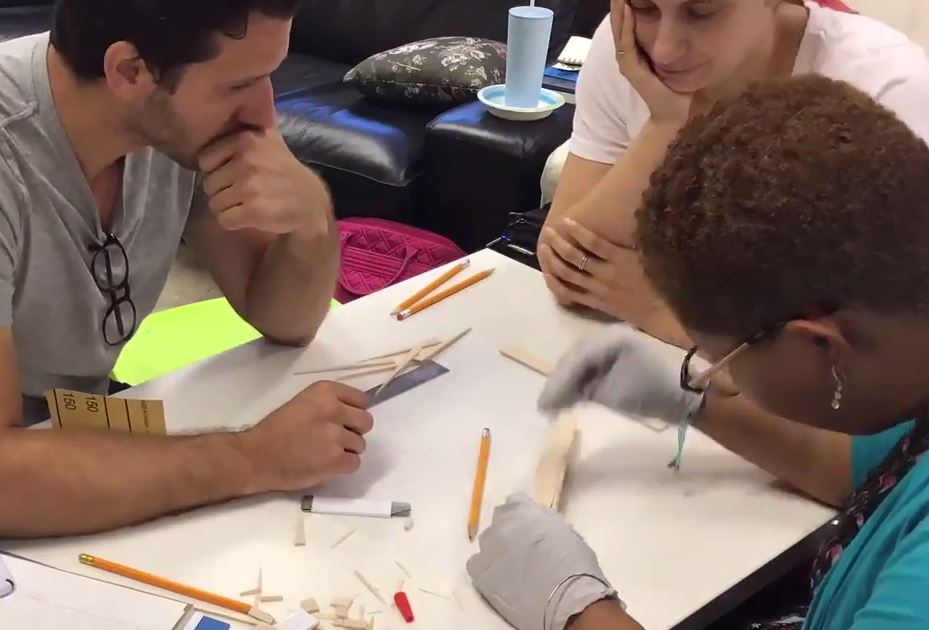Discovering Passion Projects through Dual School: Interview with Stephanie Diggins
Dual School, a pilot initiative modeled after High Tech High in California, is becoming a phenomenon in Delaware. This innovative and empowering program exemplifies “learning by doing.”
Instead of lectures and worksheets, students spend a semester digging in on a problem plaguing their community (or the world at large) from immigration to increasing financial literacy among youth. More importantly, students are encouraged to test solutions to their problem.
With a combination of independent research, mentorship, and the space to work on projects they care about, Dual School provides students with the agency to drive their own learning and acquire the skills needed to solve tomorrow’s problems.
You can find Dual School at two locations in Delaware: 1313 Innovation and William Penn High School (WP).
Our very own Rodel Teacher Council member, Stephanie Diggins, will be teaching the Dual School course this year at WP. We caught up with Stephanie while she was setting up her classroom and talked with her about this novel opportunity.
1) Can you explain what Dual School will look like at WP?
My students will participate in the Dual School course for a full school year (August – June). The students participating had to apply for the course and those accepted will receive credits toward their diploma.
Dual School’s model stresses the importance of providing a space where students can work on projects they care about.

During the first semester, my students will begin brainstorming and selecting their project or issue area. Once they’ve selected, we’ll match them with a mentor and various community leaders that can offer real-world insights into the project or issue area they are trying to solve.
And throughout the second semester, my students will build out and execute on their project in various ways such as running workshops, creating physical prototypes, and/or developing websites. My students will also exhibit their projects at two large-scale exhibitions during the school year.
2) How will this course improve the lives of your students?
Dual School is a perfect example of project-based learning. It allows my students to develop deep content knowledge as well as critical thinking, creativity, and communication skills in the context of doing an authentic, meaningful project. My students will be able to build on the skills they are learning in their classes and apply them to other areas.

This process is all very similar to what is experienced at a job or in college. Dual School will definitely prepare them for whatever path they choose after they graduate from WP.
3) Dual School is relatively new to Delaware. Prior to this opportunity, did you know about them?
Yes, I attended the final exhibition of the first cohort earlier this year. It was cool to see what the students had done for their projects. I remember there were projects on issues like mental health in schools and the tampon tax. One student even coded a website that I was so impressed by and wanted to use in my classroom.
4) After seeing the results of the first cohort, what are you most looking forward to when it comes to teaching the new Dual School class at WP?
Dual School students often work independently and in an environment that does not look like a traditional classroom. So, I am excited to see how teaching this course differs from teaching my other courses. I will not be standing in front of the class lecturing or assigning worksheets but rather having my students tell me what they need and supporting them along their project plans.
5) Sounds like you’re going to have to be flexible. What have you done to prepare for teaching this Dual School course?
Recently, I attended a professional development training hosted by Dual School and Blue Dot Education. The training covered project-based learning, which is what my Dual School students will be experiencing and I will be teaching. At the training, the facilitators asked us to build a rocket out of random materials. This assignment gave us a taste of project-based learning from a student’s perspective.

Our first rocket launch failed spectacularly but the experience was one of the most valuable I’ve ever had. We deconstructed the project, process, even the role of the facilitators. We then were able to implement the feedback and our rocket launched successfully. Check it out here!
6) Is there anything else you would like others to know about the upcoming Dual School initiative?
We need mentors for my students! Mentors can choose a day of the week from 9:00 a.m. – 10:30 a.m. to visit our classroom and advise a student working on a topic related to their work. It’s a great opportunity for both the student and mentor. Interested in becoming a Dual School mentor? Fill out an application here.
 Stephanie Diggins is a Teacher Academy and Theatre Teacher at William Penn High School in New Castle, Delaware. She is currently serving her second term on the Rodel Teacher Council.
Stephanie Diggins is a Teacher Academy and Theatre Teacher at William Penn High School in New Castle, Delaware. She is currently serving her second term on the Rodel Teacher Council.